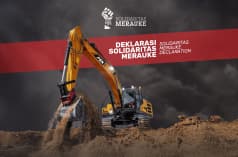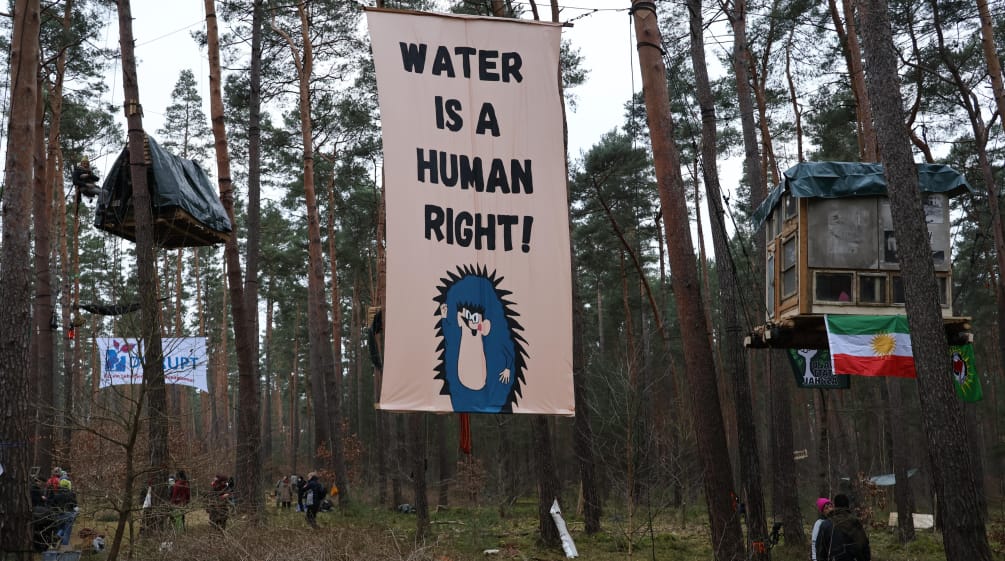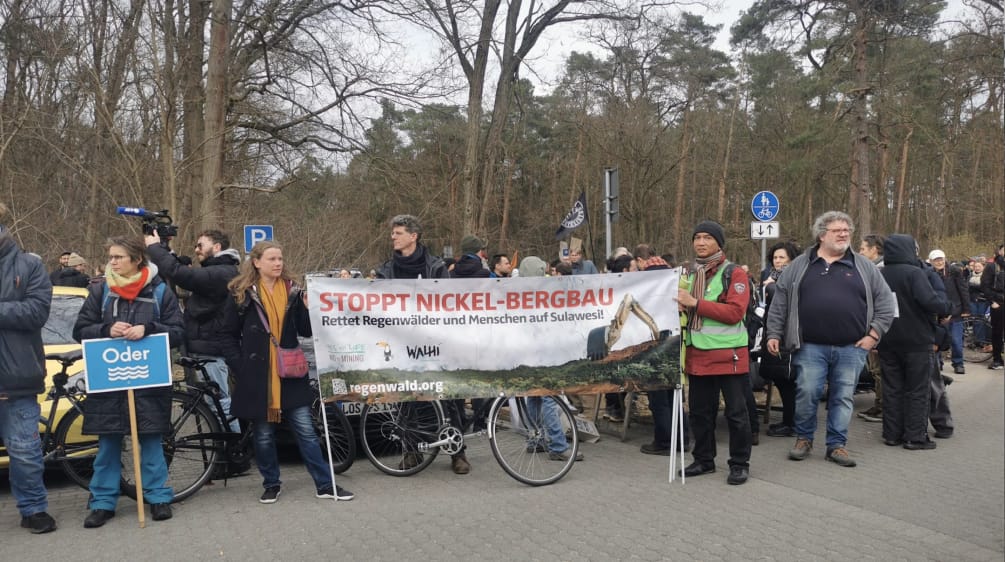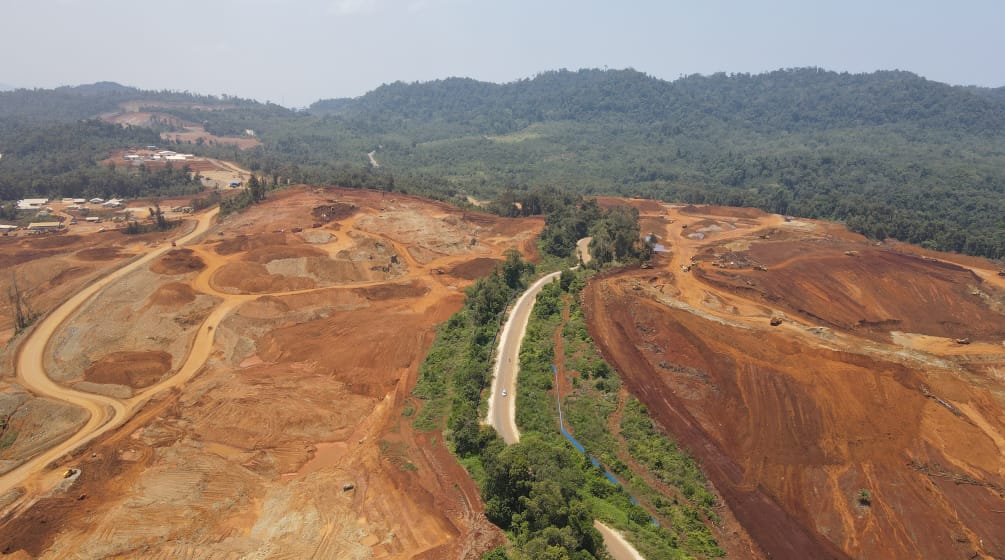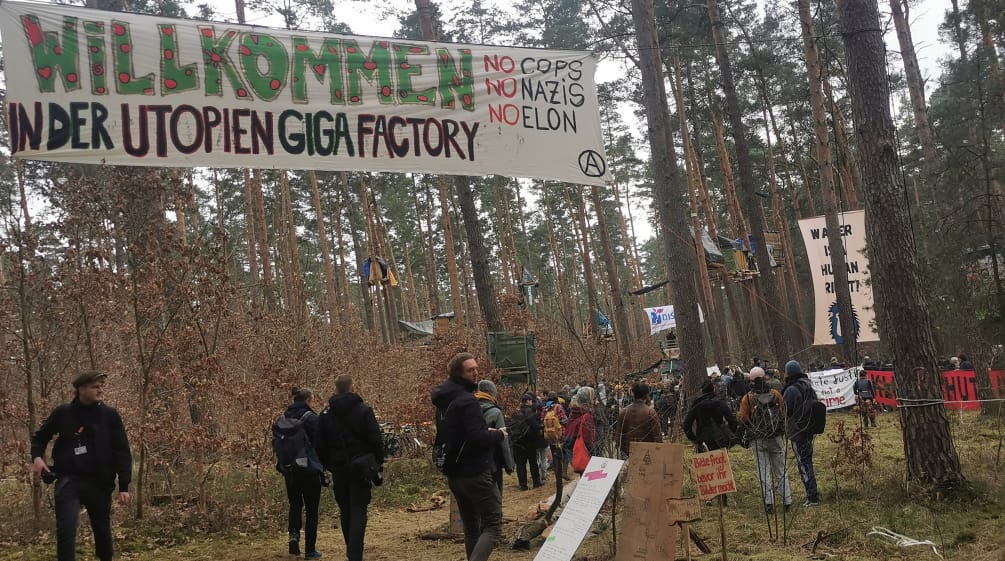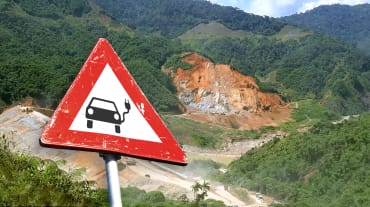Speaking out against Tesla’s German Gigafactory, mining in the global South
Mar 14, 2024
On March 10, more than 1,000 people protested against the planned expansion of the Tesla Gigafactory near Berlin. 100 hectares of forest in a water protection area are due to be destroyed for the factory. Rainforest Rescue joined the demonstration, not only out of concern for Brandenburg's water problems, but even more because of the harmful mining practices in countries of the global South.
Since February 27, environmental and human rights groups have occupied the small pine forest next to the Tesla factory, where they have built treehouses for shelter during the cold nights. Their goal: to save the forest from destruction. The neighboring Gigafactory – Tesla’s only production facility for electric vehicles on European soil – is to be expanded according to Elon Musk’s plans. This would require the destruction of 100 hectares of pine forest.
In a recent referendum, two-thirds of the population of the neighboring town of Grünheide voted against the expansion. The community already suffers from water shortages, which will be exacerbated by the Gigafactory’s consumption. The small town near Berlin is located in the driest region of Germany, and water is a precious commodity. But the referendum is non-binding, and the local council does not have to abide by it.
There are many reasons to oppose the Tesla factory expansion. Local concerns include water scarcity, deforestation, disposal of manufacturing effluent and disregard for democratic consultation.
Rainforest Rescue also warns of the dramatic consequences in the countries where the raw materials for electric vehicles, especially the metals needed for their batteries, are mined and processed.
The rapid escalation of the destruction of our planet requires much more than just replacing fossil fuels. That would be nothing more than a short-term, illusory solution. The extinction crisis, global warming, and the destruction of entire ecosystems require real solutions on a global scale. “Business as usual” will destroy the basis of life for all humanity.
Water is a human right!
The banner in the pine forest threatened by Tesla’s expansion shows that this is not just about a patch of trees in a small community near Berlin.
The treehouses were built eight to ten meters up by the “Stop Tesla” initiative. The camp is located in the planned expansion area between the Tesla factory and the Fangschleuse train station. The authorities initially tolerated the protest until March 15. After a short visit by Elon Musk on March 13, they wanted to clear the camp. To prevent this, the activists asked for an extension. In the meantime, they are preparing for a possible eviction.
“Our protest cannot be dismissed, we will stay,” said Caro Weber of the “Stop Tesla” group.
The initiative “Tesla den Hahn abdrehen” (Turn off the tap on Tesla) had called for a demonstration on Sunday, March 10. Approximately 1,200 people marched from the Fangschleuse station to Grünheide to demand that the local council implement the referendum.
Rainforest Rescue was also there with the message:
Stop nickel mining! Save Sulawesi’s rainforests and communities!
Together with our partner organizations WALHI South Sulawesi and Yes to Life – No to Mining , we warn against the increasing consumption of resources – especially nickel – for electric vehicles. An EV battery alone contains 30 to 50 kg of nickel. The main mining area is on the Indonesian island of Sulawesi.
“The effects are already being felt in Indonesia, with rainforest being cut down, farmland destroyed and fishing grounds poisoned,” says Marianne Klute of Rainforest Rescue. “The global race for supposedly green economic growth is a terrible mistake, as resource consumption is skyrocketing at the expense of biodiversity, the climate and the people in the producing countries.”
Guadalupe Rodriguez of Rainforest Rescue warns: “The destruction for nickel in Indonesia is not unique. The massive and growing extraction of metals for the production of electric vehicles is also taking place in other countries, as the cases of copper in Ecuador and lithium in Chile show. This is a massive attack on the common property of many peoples around the world.”
During the demonstration, two activists from Botswana and Zimbabwe spoke about the situation in African countries. War and genocide are raging in the Congo; the exploitation of resources like cobalt for electric vehicle batteries is causing more conflict. Our freedom of mobility in rich countries comes at the expense of people in the global South. Many people there have no access to electricity, let alone electric vehicles.
“The scale of destruction is unacceptable. Is that fair? We did not create these situations, but we suffer from them. What about us? Imagine the same thing happening here. Would you want that?” shouted Steven from Fridays for Future Africa.
Is this the world we want? Is this the future for our children?
Muhammad Al Amien from Aliansi Sulawesi sent solidarity greetings to the demonstration and to the community of Grünheide. In his view:
The expansion of the production of electric cars is extremely irresponsible and will increase the negative environmental and social consequences.

